Unit 8 Is there a post office near here? 期末知识归纳+综合能力提升(含答案)
文档属性
| 名称 | Unit 8 Is there a post office near here? 期末知识归纳+综合能力提升(含答案) | 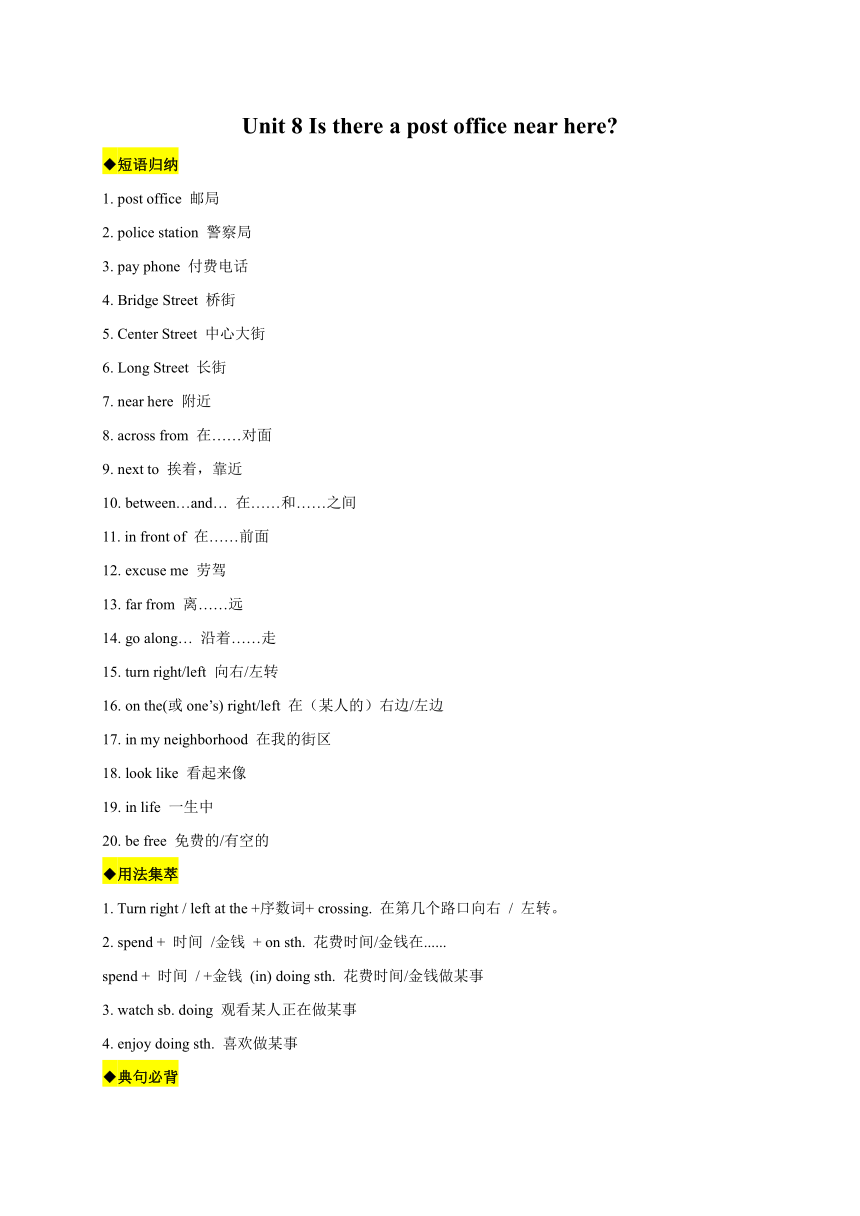 | |
| 格式 | zip | ||
| 文件大小 | 22.4KB | ||
| 资源类型 | 教案 | ||
| 版本资源 | 人教新目标(Go for it)版 | ||
| 科目 | 英语 | ||
| 更新时间 | 2020-06-15 20:26:07 | ||
图片预览

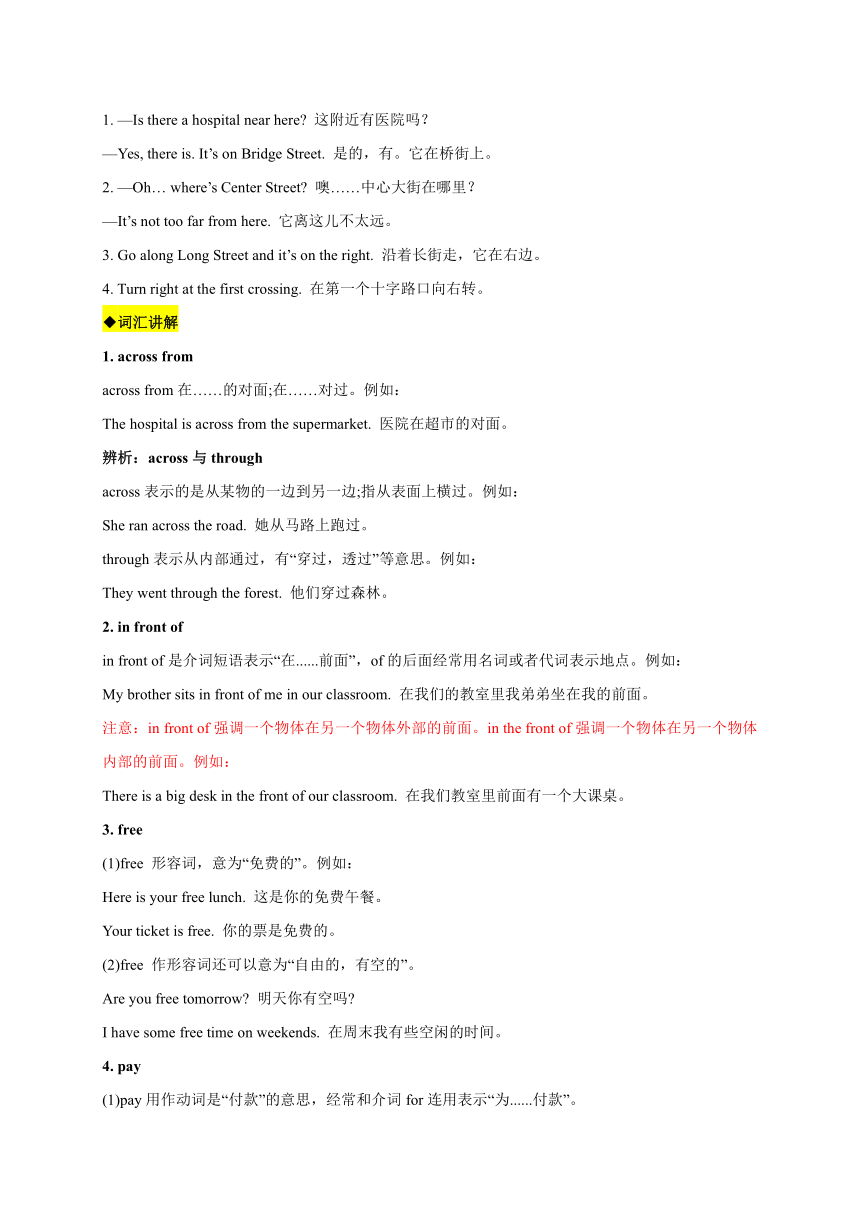
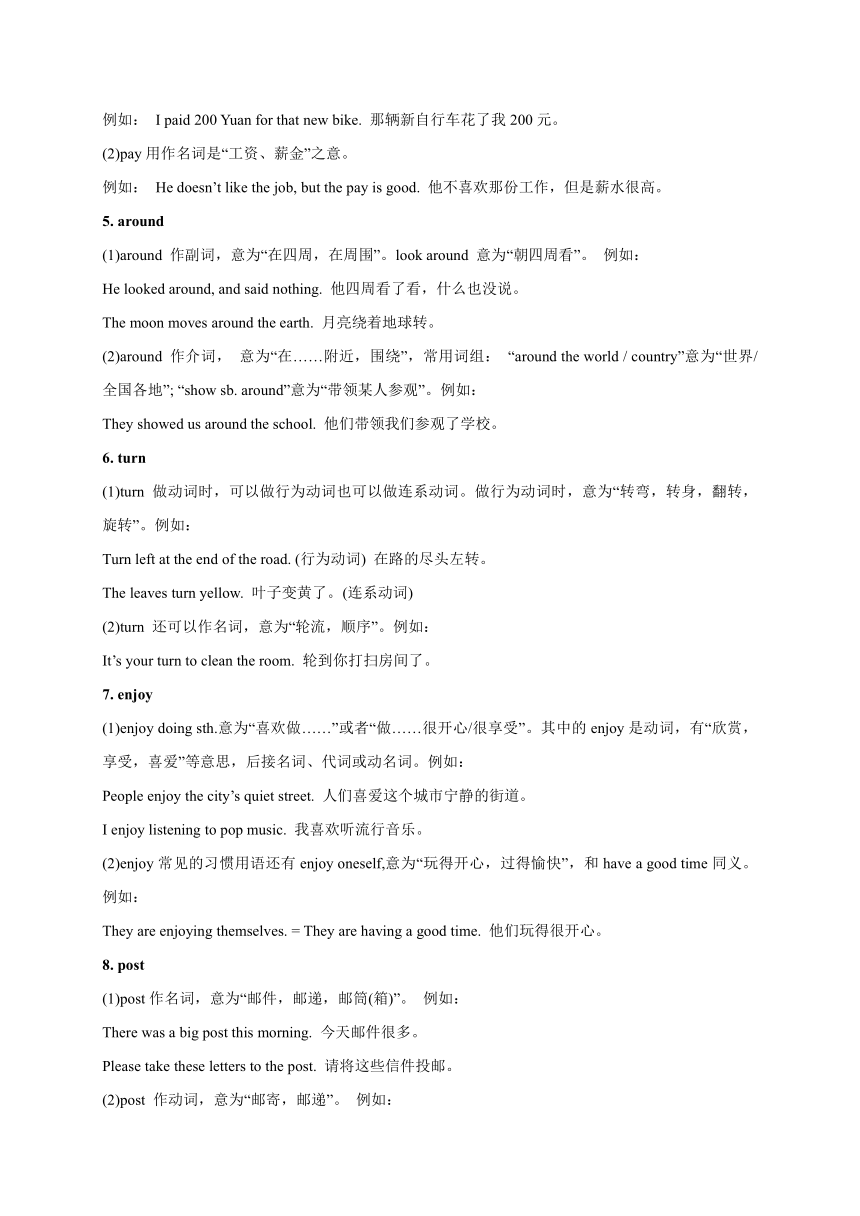
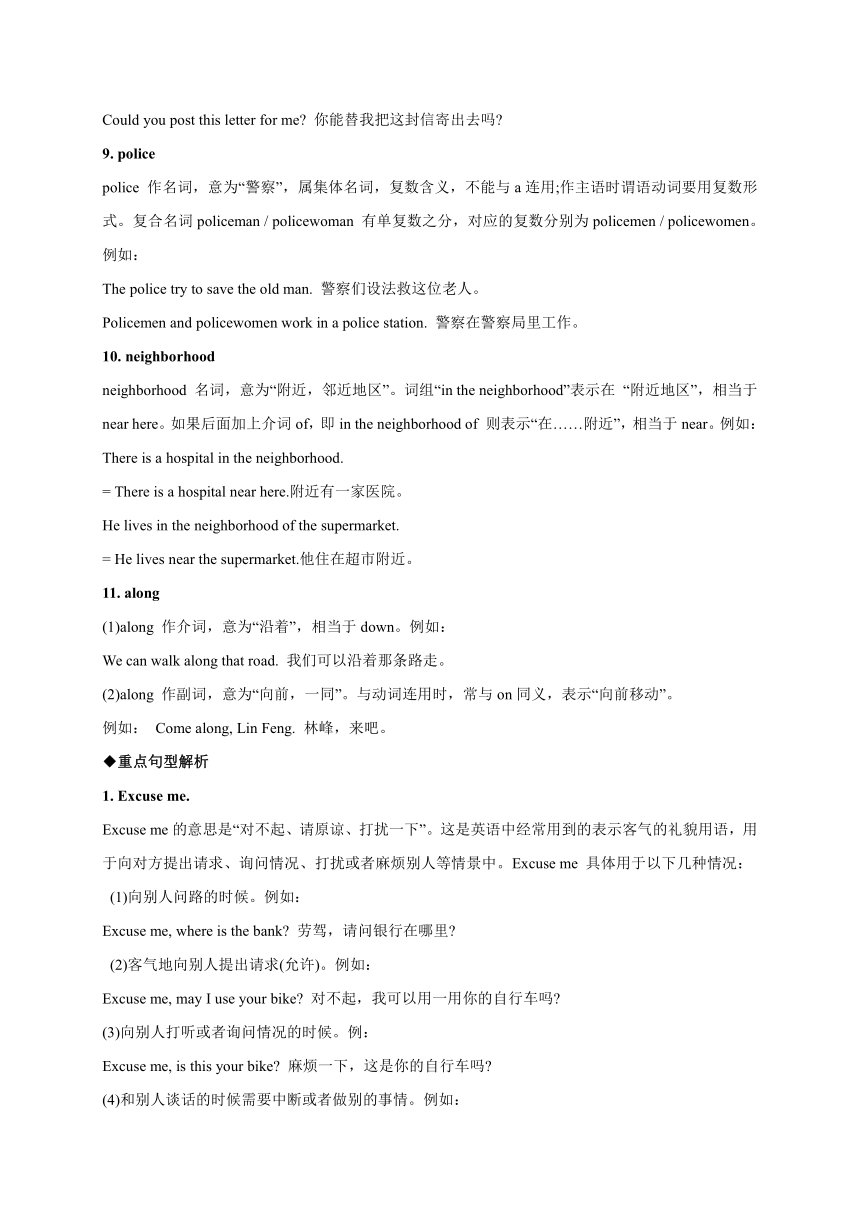
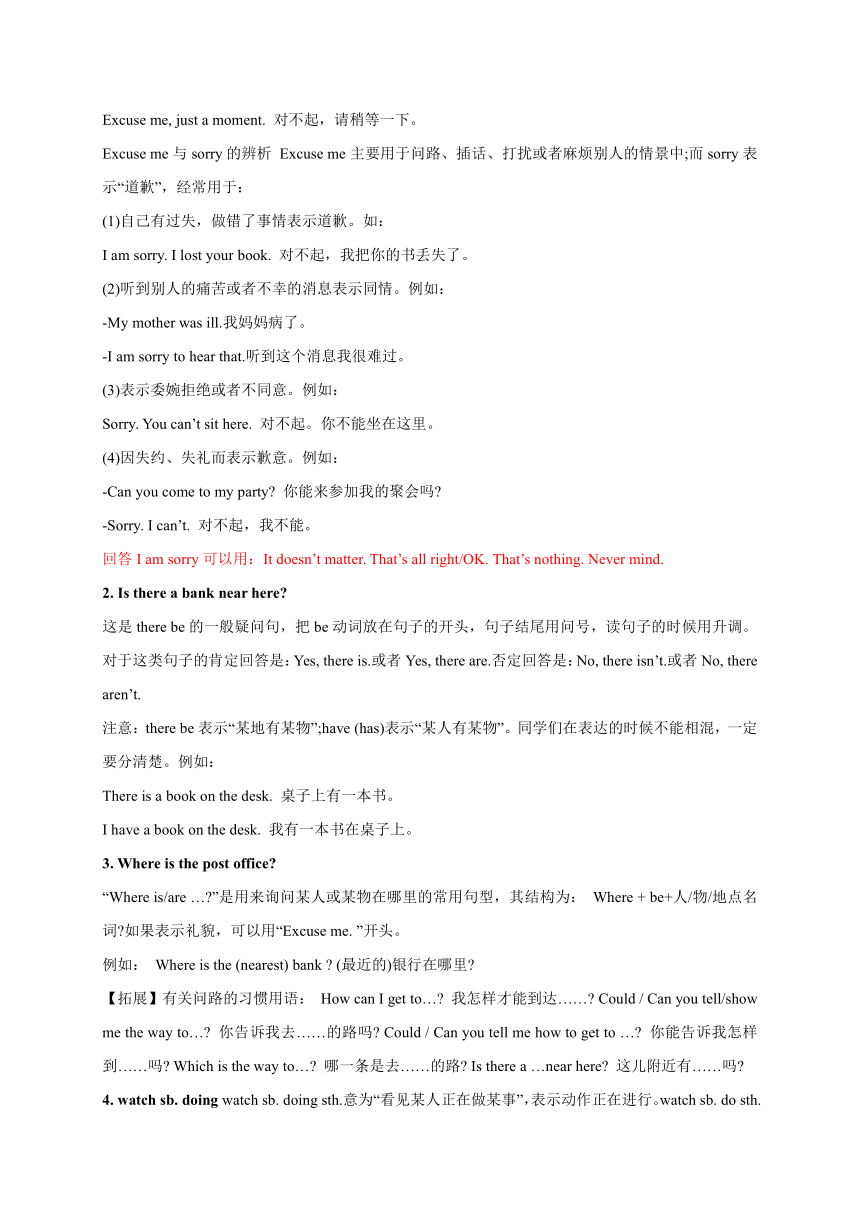
文档简介
Unit
8
Is
there
a
post
office
near
here?
◆短语归纳
1.
post
office
邮局
2.
police
station
警察局
3.
pay
phone
付费电话
4.
Bridge
Street
桥街
5.
Center
Street
中心大街
6.
Long
Street
长街
7.
near
here
附近
8.
across
from
在……对面
9.
next
to
挨着,靠近
10.
between…and…
在……和……之间
11.
in
front
of
在……前面
12.
excuse
me
劳驾
13.
far
from
离……远
14.
go
along…
沿着……走
15.
turn
right/left
向右/左转
16.
on
the(或one’s)
right/left
在(某人的)右边/左边
17.
in
my
neighborhood
在我的街区
18.
look
like
看起来像
19.
in
life
一生中
20.
be
free
免费的/有空的
◆用法集萃
1.
Turn
right
/
left
at
the
+序数词+
crossing.
在第几个路口向右
/
左转。
2.
spend
+
时间
/金钱
+
on
sth.
花费时间/金钱在......
spend
+
时间
/
+金钱
(in)
doing
sth.
花费时间/金钱做某事
3.
watch
sb.
doing
观看某人正在做某事
4.
enjoy
doing
sth.
喜欢做某事
◆典句必背
1.
—Is
there
a
hospital
near
here?
这附近有医院吗?
—Yes,
there
is.
It’s
on
Bridge
Street.
是的,有。它在桥街上。
2.
—Oh…
where’s
Center
Street?
噢……中心大街在哪里?
—It’s
not
too
far
from
here.
它离这儿不太远。
3.
Go
along
Long
Street
and
it’s
on
the
right.
沿着长街走,它在右边。
4.
Turn
right
at
the
first
crossing.
在第一个十字路口向右转。
◆词汇讲解
1.
across
from
across
from在……的对面;在……对过。例如:
The
hospital
is
across
from
the
supermarket.
医院在超市的对面。
辨析:across与through
across表示的是从某物的一边到另一边;指从表面上横过。例如:
She
ran
across
the
road.
她从马路上跑过。
through表示从内部通过,有“穿过,透过”等意思。例如:
They
went
through
the
forest.
他们穿过森林。
2.
in
front
of
in
front
of是介词短语表示“在......前面”,of的后面经常用名词或者代词表示地点。例如:
My
brother
sits
in
front
of
me
in
our
classroom.
在我们的教室里我弟弟坐在我的前面。
注意:in
front
of强调一个物体在另一个物体外部的前面。in
the
front
of强调一个物体在另一个物体内部的前面。例如:
There
is
a
big
desk
in
the
front
of
our
classroom.
在我们教室里前面有一个大课桌。
3.
free
(1)free
形容词,意为“免费的”。例如:
Here
is
your
free
lunch.
这是你的免费午餐。
Your
ticket
is
free.
你的票是免费的。
(2)free
作形容词还可以意为“自由的,有空的”。
Are
you
free
tomorrow?
明天你有空吗?
I
have
some
free
time
on
weekends.
在周末我有些空闲的时间。
4.
pay
(1)pay用作动词是“付款”的意思,经常和介词for连用表示“为......付款”。
例如:
I
paid
200
Yuan
for
that
new
bike.
那辆新自行车花了我200元。
(2)pay用作名词是“工资、薪金”之意。
例如:
He
doesn’t
like
the
job,
but
the
pay
is
good.
他不喜欢那份工作,但是薪水很高。
5.
around
(1)around
作副词,意为“在四周,在周围”。look
around
意为“朝四周看”。
例如:
He
looked
around,
and
said
nothing.
他四周看了看,什么也没说。
The
moon
moves
around
the
earth.
月亮绕着地球转。
(2)around
作介词,
意为“在……附近,围绕”,常用词组:
“around
the
world
/
country”意为“世界/全国各地”;
“show
sb.
around”意为“带领某人参观”。例如:
They
showed
us
around
the
school.
他们带领我们参观了学校。
6.
turn
(1)turn
做动词时,可以做行为动词也可以做连系动词。做行为动词时,意为“转弯,转身,翻转,旋转”。例如:
Turn
left
at
the
end
of
the
road.
(行为动词)
在路的尽头左转。
The
leaves
turn
yellow.
叶子变黄了。(连系动词)
(2)turn
还可以作名词,意为“轮流,顺序”。例如:
It’s
your
turn
to
clean
the
room.
轮到你打扫房间了。
7.
enjoy
(1)enjoy
doing
sth.意为“喜欢做……”或者“做……很开心/很享受”。其中的enjoy是动词,有“欣赏,享受,喜爱”等意思,后接名词、代词或动名词。例如:
People
enjoy
the
city’s
quiet
street.
人们喜爱这个城市宁静的街道。
I
enjoy
listening
to
pop
music.
我喜欢听流行音乐。
(2)enjoy常见的习惯用语还有enjoy
oneself,意为“玩得开心,过得愉快”,和have
a
good
time同义。例如:
They
are
enjoying
themselves.
=
They
are
having
a
good
time.
他们玩得很开心。
8.
post
(1)post作名词,意为“邮件,邮递,邮筒(箱)”。
例如:
There
was
a
big
post
this
morning.
今天邮件很多。
Please
take
these
letters
to
the
post.
请将这些信件投邮。
(2)post
作动词,意为“邮寄,邮递”。
例如:
Could
you
post
this
letter
for
me?
你能替我把这封信寄出去吗?
9.
police
police
作名词,意为“警察”,属集体名词,复数含义,不能与a连用;作主语时谓语动词要用复数形式。复合名词policeman
/
policewoman
有单复数之分,对应的复数分别为policemen
/
policewomen。例如:
The
police
try
to
save
the
old
man.
警察们设法救这位老人。
Policemen
and
policewomen
work
in
a
police
station.
警察在警察局里工作。
10.
neighborhood
neighborhood
名词,意为“附近,邻近地区”。词组“in
the
neighborhood”表示在
“附近地区”,相当于near
here。如果后面加上介词of,即in
the
neighborhood
of
则表示“在……附近”,相当于near。例如:
There
is
a
hospital
in
the
neighborhood.
=
There
is
a
hospital
near
here.附近有一家医院。
He
lives
in
the
neighborhood
of
the
supermarket.
=
He
lives
near
the
supermarket.他住在超市附近。
11.
along
(1)along
作介词,意为“沿着”,相当于down。例如:
We
can
walk
along
that
road.
我们可以沿着那条路走。
(2)along
作副词,意为“向前,一同”。与动词连用时,常与on同义,表示“向前移动”。
例如:
Come
along,
Lin
Feng.
林峰,来吧。
◆重点句型解析
1.
Excuse
me.
Excuse
me的意思是“对不起、请原谅、打扰一下”。这是英语中经常用到的表示客气的礼貌用语,用于向对方提出请求、询问情况、打扰或者麻烦别人等情景中。Excuse
me
具体用于以下几种情况:
(1)向别人问路的时候。例如:
Excuse
me,
where
is
the
bank?
劳驾,请问银行在哪里?
(2)客气地向别人提出请求(允许)。例如:
Excuse
me,
may
I
use
your
bike?
对不起,我可以用一用你的自行车吗?
(3)向别人打听或者询问情况的时候。例:
Excuse
me,
is
this
your
bike?
麻烦一下,这是你的自行车吗?
(4)和别人谈话的时候需要中断或者做别的事情。例如:
Excuse
me,
just
a
moment.
对不起,请稍等一下。
Excuse
me与sorry的辨析
Excuse
me主要用于问路、插话、打扰或者麻烦别人的情景中;而sorry表示“道歉”,经常用于:
(1)自己有过失,做错了事情表示道歉。如:
I
am
sorry.
I
lost
your
book.
对不起,我把你的书丢失了。
(2)听到别人的痛苦或者不幸的消息表示同情。例如:
-My
mother
was
ill.我妈妈病了。
-I
am
sorry
to
hear
that.听到这个消息我很难过。
(3)表示委婉拒绝或者不同意。例如:
Sorry.
You
can’t
sit
here.
对不起。你不能坐在这里。
(4)因失约、失礼而表示歉意。例如:
-Can
you
come
to
my
party?
你能来参加我的聚会吗?
-Sorry.
I
can’t.
对不起,我不能。
回答I
am
sorry可以用:It
doesn’t
matter.
That’s
all
right/OK.
That’s
nothing.
Never
mind.
2.
Is
there
a
bank
near
here?
这是there
be的一般疑问句,把be动词放在句子的开头,句子结尾用问号,读句子的时候用升调。对于这类句子的肯定回答是:Yes,
there
is.或者Yes,
there
are.否定回答是:No,
there
isn’t.或者No,
there
aren’t.
注意:there
be表示“某地有某物”;have
(has)表示“某人有某物”。同学们在表达的时候不能相混,一定要分清楚。例如:
There
is
a
book
on
the
desk.
桌子上有一本书。
I
have
a
book
on
the
desk.
我有一本书在桌子上。
3.
Where
is
the
post
office?
“Where
is/are
…?”是用来询问某人或某物在哪里的常用句型,其结构为:
Where
+
be+人/物/地点名词?如果表示礼貌,可以用“Excuse
me.
”开头。
例如:
Where
is
the
(nearest)
bank
?
(最近的)银行在哪里?
【拓展】有关问路的习惯用语:
How
can
I
get
to…?
我怎样才能到达……?
Could
/
Can
you
tell/show
me
the
way
to…?
你告诉我去……的路吗?
Could
/
Can
you
tell
me
how
to
get
to
…?
你能告诉我怎样到……吗?
Which
is
the
way
to…?
哪一条是去……的路?
Is
there
a
…near
here?
这儿附近有……吗?
4.
watch
sb.
doing
watch
sb.
doing
sth.意为“看见某人正在做某事”,表示动作正在进行。watch
sb.
do
sth.意为“看(见)某人做某事”,表示一次完整的动作过程或经常性、习惯性的动作。例如:
Amy
watched
Mary
play
basketball
on
the
playground
yesterday.
昨天Amy在操场上观看Mary打篮球。
The
old
man
was
watching
his
grandsons
playing
on
the
floor.
那位老人正注视着孙子们在地板上玩。【拓展】除watch外,其他感官动词,如look(看),see(看到),notice(注意到),hear(听见),listen(听)等,也有类似用法,即表示习惯性动作时,后接动词原形作宾补;表示正在进行的动作时,后接-ing形式作宾补。例如:
I
saw
Li
Ming
playing
near
the
river
on
my
way
home.在我回家路上,我看见李明正在河边玩。
5.
They
look
like
my
friends
and
me
when
we
fight!
look
like意为“看起来像……”应用范围最广,除了描述人、物之外,也能抽象表达事件或现象。
例如:
He
looks
like
a
famous
movie
star.
他看起来像一个电影明星。
That
bicycle
looks
just
like
the
one
I
used
to
have.
那个自行车看起来像我曾经拥有的那个。
It
looks
like
it's
going
to
rain
soon.
天看起来要下雨。
注意:What
does/do
sb/sth
look
like?
这个句式是询问某个人或物的外貌特征。例如:
—What
does
the
girl
look
like?
那个女孩长什么样?
—She
is
short
and
thin.
她又矮又瘦。
拓展:be
like意为“像……”。例如:
—What
is
the
old
man
like?
那个老人怎么样?
—He
is
kind.
他很和蔼。
综合能力提升
I.用括号中所给单词的适当形式填空。
1.
My
little
brother
enjoys
_______
(watch)
TV.
2.
He
can
answer
this
question
_______(easy).
3.
Let’s
go
______
(climb)
tomorrow.
4.
The
police
______
(be)
looking
for
the
lost
child.
5.
Linda
often
______
(take)
a
walk
in
the
park.
6.
I
enjoy
______
(me)
in
the
summer
holiday.
7.
Mike
often
______
(spend)
much
money
on
books.
8.
They
like
_____
(swim)
very
much.
9.
Turn
left
at
the
third
______
(cross)
and
then
you
can
find
it.
10.
Excuse
______
(I).
Please
tell
me
the
way
to
the
bank.
Ⅱ.
句型转换,每空一词。
1.
The
post
office
is
next
to
the
bank.
(对划线部分提问)
_______
_______
the
post
office?
2.
There
is
a
park
on
the
other
side
of
the
street.
(改为同义句)
_______
________
the
street
there’s
a
park.
3.
The
pay
phone
is
behind
the
library.
(改为同义句)
The
library
is
________
________
________
the
pay
phone.
4.
There
is
a
pay
phone
near
the
bank.
(改为一般疑问句)
_______
_______
a
pay
phone
near
the
bank?
5.
Is
there
a
post
office
on
Fifth
Avenue?
(做肯定回答)
_______,
_______
_______.
Ⅲ.
根据汉语意思,完成句子,每空一词。
1.
我们可以听见鸟儿在四周歌唱。
We
can
hear
the
birds_______
_______
us.
2.
我总是在晚饭后花30分钟时间散步。
I
always
______
thirty
minutes
______
after
supper.
3.
我喜欢看那个女孩儿和小狗一起玩耍。
I
like
to
______
the
girl
______with
the
dog.
4.
从这个地铁站你怎样到达服装店呢?
_______
do
you
_______
_______
a
clothes
store
from
the
subway
station?
5.
我们的新老师长什么样?
_______
does
our
new
teacher______
______?
IV.单项选择
1.—Excuse
me.
Is
there
a
bank
near
here?
—No,________.
But
you
can
find
one
in
Yang
Fang
Road.
A.there
isn't
B.it
isn't
C.they
aren't
D.there
is
2.—Where
is
the
hotel?
—It's________
Bridge
Street,________the
right.
A.on;on
B.on;down
C.on;of
D.at;in
3.The
old
man
________
sitting
in
the
house
because
it's
________.
A.enjoys;quiet
B.enjoy;quiet
C.enjoys;dirty
D.enjoy;clean
4.Just
go
down
the
street
and
you
will
find
the
restaurant
on
your
left.
A.with
B.along
C.across
D.between
5.There________
some
milk
and
apples
in
the
fridge.
A.has
B.have
C.is
D.are
6.There's
a
tall
tree
________
the
house.
A.in
the
front
of
B.in
front
of
C.in
the
front
D.at
front
of
7.It's________
to
talk
with
friends
on
a
rainy
day.
A.relax
B.relaxed
C.relaxes
D.relaxing
8.Most
of
the
children
enjoy
________
sweet
things.
A.eat
B.to
eat
C.eating
D.ate
9.The
old
man
often
watches
him
________
football
with
his
friends.
A.plays
B.play
C.playing
D.to
play
10.________the
early
bus,
he
has
to
get
up
before
5:00
every
morning.
A.Catch
B.To
catch
C.Catching
D.Catches
V.完形填空
Dear
Lucy,
My
fifteenth
birthday
is
coming.
I
am
going
to
have
a
birthday
party
in
____1____
house.
It's
on
Friday
afternoon.
I
sincerely
____2____
you,but
I'm
sorry
I
can't
go
to
the
____3____
to
meet
you.
Here
is
a
map
and
it
can
help
you
____4____
my
house.
Look
at
the
map!
After
you
get
out
of
the
airport,
____5____
down
Yanshan
Street
and
then
walk
____6____
he
Sixth
Avenue.
Then
you
can
____7____
a
bus
stop
on
your
right.
____8____
the
No.19
bus
there
and
get
off
(下车)at
the
third
stop.
Then
you
are
____9____
Center
Street.
Go
along
the
street
and
you
will
see
a
____10____
on
your
left.
My
house
is
behind
the
supermarket.
Tom
1.A.
his
B.your
C.my
D.her
2.A.
hope
B.wish
C.know
D.invite
3.A.
park
B.bank
C.bus
station
D.airport
4.A.
pass
B.find
C.show
D.enjoy
5.A.
run
B.turn
C.walk
D.arrive
6.A.
across
B.in
C.with
D.from
7.A.
look
B.see
C.watch
D.pass
8.A.
Buy
B.Bring
C.Take
D.Visit
9.A.
on
B.from
C.to
D.of
10.A.
library
B.park
C.pay
phone
D.supermarket
VI.阅读理解
A
Mrs.
Brown
goes
to
see
her
son
in
London.
Her
son
works
in
a
music
club
there.
Mrs.
Brown
doesn't
know
London
very
well.
And
she
can't
find
her
way.
She
sees
a
man
at
a
bus
stop.
She
wants
to
ask
the
man
the
way.
“Excuse
me!
But
can
you
tell
me
which
bus
goes
to
Miller's
shop?”
Mrs.
Brown
asks.
The
man
is
very
friendly.
He
smiles,
but
he
can't
speak
English.
He
can
speak
French.
He
is
new
in
London.
He
puts
his
hands
in
his
coat
and
takes
out
a
small
book.
He
opens
it
and
reads
something
on
it.“I
am
sorry.
I
can't
speak
English.”
1.Mrs.
Brown
goes
to
________
in
London.
A.work
in
a
club
B.find
the
way
C.see
her
son
D.ask
the
man
2.Mrs.
Brown's
son
works
in
________.
A.a
music
club
B.Miller's
shop
C.a
big
school
D.a
bus
stop
3.What
does
“bus
stop”
mean?
A.车库
B.加油站
C.交通灯
D.车站
4.Mrs.
Brown
can't
find
her
way
because
________.
A.she
is
old
B.she
is
new
in
London
C.she
doesn't
know
London
very
well
D.she
can't
see
5.Which
of
the
following
is
right?
A.The
man
at
the
bus
stop
is
an
Englishman.
B.The
man
can't
help
Mrs.
Brown.
C.Mrs.
Brown
can't
speak
English.
D.Mrs.
Brown
borrows(借)
the
book
from
the
man.
B
I
like
visiting
museums
(博物馆)
on
weekends.
In
them
I
can
see
lots
of
interesting
things.
In
London
there
are
lots
of
museums.
Across
from
my
house
is
the
British
Museum.
Going
to
the
museum
is
free
but
I
don't
like
going
there.
In
the
museum
I
can't
speak
with
people.
I
can't
touch
(摸)
the
things
and
I
can't
take
photos.
The
Science
Museum
is
not
near
my
house
and
I
can't
take
photos
in
it.
But
I
like
going
there,
because
I
can
run,
touch
the
things
and
speak
with
people
in
it.
In
the
museum,
I
can
also
do
some
interesting
things
by
myself.
It's
a
good
way
to
learn
about
science.
The
Science
Museum
is
open
from
10
am
to
6
pm
every
day.
If
you
have
time,
please
visit
it.
It's
my
favorite
place
in
the
world.
6.
The
writer
likes
________
on
weekends.
A.going
to
the
park
B.going
to
the
museums
C.playing
computer
games
D.going
to
the
supermarket
7.
The
British
Museum
is
________
the
writer's
house.
A.next
to
B.in
front
of
C.behind
D.across
from
8.
In
the
Science
Museum,
people
can't
________.
A.run
B.speak
with
people
C.take
photos
D.touch
the
things
9.
The
underlined
word
“open”
means
“________”
in
Chinese.
A.营业
B.开始
C.开业
D.打开
10.
Which
of
the
following
is
NOT
true?
A.The
Science
Museum
is
open
at
10
am.
B.The
writer
likes
the
Science
Museum.
C.Going
to
the
British
Museum
is
free.
D.The
writer
can
touch
the
things
in
the
British
Museum.
VII.用恰当的词填空,完成对话,每空一词。
W:Excuse
me,
is
there
a
bookstore
around
here?
M:Yes.
There
is
________(1)on
Zhongshan
Road.
It's
between
the
parking
lot
and
the
supermarket.
W:How
________(2)
is
it
from
here?
M:About
thirty
minutes'
walk.
You
can
________(3)
the
No.14
bus
there.
W:Thank
you.
By
the
way,
________(4)
the
bus
stop?
M:It's
at
the
end
of
this
street.
You
can't
________(5)
it.
W:Thanks
for
your
help.
M:You're
welcome.
VIII.
书面表达
假设你叫李雷,
这个星期天是你的生日,你准备在家举办一个生日聚会,聚会在六点钟开始。你邀请了你的一些朋友参加,Susan
也在其中,
可她不知道去你家的路。你家住在Bridge
Street,乘坐六路或八路公共汽车在Bridge
Street站下车,下车后直走,然后在第一个十字路口右拐,左边有一个邮局,你家就在邮局的对面,房子是红色的,很容易找到。请根据所给信息给Susan写封邮件。
_______________________________________________________________________________________________________________________________________________________________________________________________________________________________________________________________________________________________________________________________________________________
参考答案
I用括号中所给单词的适当形式填空。
1.
watching
2.
easily
3.
climbing
4.
are
5.
takes
6.
myself
7.
spends
8.
swimming
9.
crossing
10.
Me
Ⅱ.
句型转换,每空一词。
1.
Where
is
2.
Across
from
3.
in
front
of
4.
Is
there
5.
Yes,
there
is
Ⅲ.
根据汉语意思,完成句子,每空一词。
1.
singing
around
2.
spend,
walking
3.
watch,
play
4.
How,
get
to
5.
What,
look
like
IV.
单项选择
1.A
2.A
3.A
【解析】句意:这个老年人喜欢在屋里坐着,因为那儿安静。主语是第三人称单数,故谓语动词也用第三人称单数形式。根据句意可知A项正确。
4.B
5.C
【解析】句意:冰箱里有些牛奶和苹果。There
be句型谓语动词符合就近原则,而milk是不可数名词,所以谓语动词用单数。
6.B
【解析】in
the
front
of在……的前部,指内部空间位置;in
front
of在……的前面,指外部空间位置。由语境可知选B。
7.D
【解析】本题采用词语辨析法解答。relaxing指事物本身是“令人放松的”;而relaxed则指“人感到放松的”。由句意“在雨天和朋友们聊天是很放松的。”可知选D。
8.C
【解析】固定搭配法。enjoy后跟名词或动词的?ing形式。
9.B
【解析】考查watch的用法。Watch
sb.
do
sth.看到某人做某事可表示全过程,也可以表示经常性动作;watch
sb.
doing
sth.看见某人正在做某事,由often可知选B。
10.B
【解析】语法判定法。动词不定式短语作目的状语。
V.
完形填空
1.C
2.D
【解析】请别人来参加自己的生日聚会应用invite。
3.D
【解析】考查地点名词。用联系上下文法做此题。由下文中提到的机场可知,这里指的是不能到机场去接你。
4.B
5.C
6.A
7.B
8.C
9.A
10.D
【解析】考查地点名词。用联系上下文法做此题。由下文中的超市可知,此处意为“你将在你的左边看见一个超市”。
VI.
阅读理解
A
1.C
【解析】根据句子“Mrs.
Brown
goes
to
see
her
son
in
London.”可知是去看儿子的。
2.A
【解析】由句子“Her
son
works
in
a
music
club
there.”可知选A。
3.D
【解析】根据句意可知她是在车站看见了一个人。
4.C
【解析】由句子“Mrs.
Brown
doesn't
know
London
very
well.
And
she
can't
find
her
way.”可知选C。
5.B
【解析】根据句中“He
smiles,but
he
can't
speak
English...He
is
new
in
London.”可知B项说法正确。
B
6.B
【解析】由第一段首句“I
like
visiting
museums(博物馆)
on
weekends.”可知,作者周末喜欢参观博物馆,故选B。
7.D
8.C
【解析】由第二段中“The
Science
Museum
is
not
near
my
house
and
I
can't
take
photos
in
it.”可知,人们不能在科学博物馆里拍照。
9.A
【解析】每天上午十点到下午六点是这家科学博物馆的营业时间,故选A。
10.
D
VII.用恰当的词填空,完成对话,每空一词。
1.one
【解析】此处one代替上句中的a
bookstore。
2.far
3.take
4.where's
5.miss
【解析】由句意“你不会错过它的。”可知,此处填动词miss。
VIII.
书面表达
Dear
Susan,
This
Sunday
is
my
birthday.
I’ll
have
a
birthday
at
my
home.
It
starts
at
6p.m..
Would
you
like
to
come?
I’ll
ask
some
of
my
friends
to
come.
My
home
is
on
Bridge
Street.
You
can
take
a
No.6
or
No.8
bus,
and
get
off
on
Bridge
Street.
Go
straight
,and
then
turn
right
at
the
first
crossing
.You
can
see
a
post
office
on
your
left.
My
home
is
across
from
the
post
office.
It
is
a
red
house.
You
won’t
miss
it.
Yours,
Li
Lei
8
Is
there
a
post
office
near
here?
◆短语归纳
1.
post
office
邮局
2.
police
station
警察局
3.
pay
phone
付费电话
4.
Bridge
Street
桥街
5.
Center
Street
中心大街
6.
Long
Street
长街
7.
near
here
附近
8.
across
from
在……对面
9.
next
to
挨着,靠近
10.
between…and…
在……和……之间
11.
in
front
of
在……前面
12.
excuse
me
劳驾
13.
far
from
离……远
14.
go
along…
沿着……走
15.
turn
right/left
向右/左转
16.
on
the(或one’s)
right/left
在(某人的)右边/左边
17.
in
my
neighborhood
在我的街区
18.
look
like
看起来像
19.
in
life
一生中
20.
be
free
免费的/有空的
◆用法集萃
1.
Turn
right
/
left
at
the
+序数词+
crossing.
在第几个路口向右
/
左转。
2.
spend
+
时间
/金钱
+
on
sth.
花费时间/金钱在......
spend
+
时间
/
+金钱
(in)
doing
sth.
花费时间/金钱做某事
3.
watch
sb.
doing
观看某人正在做某事
4.
enjoy
doing
sth.
喜欢做某事
◆典句必背
1.
—Is
there
a
hospital
near
here?
这附近有医院吗?
—Yes,
there
is.
It’s
on
Bridge
Street.
是的,有。它在桥街上。
2.
—Oh…
where’s
Center
Street?
噢……中心大街在哪里?
—It’s
not
too
far
from
here.
它离这儿不太远。
3.
Go
along
Long
Street
and
it’s
on
the
right.
沿着长街走,它在右边。
4.
Turn
right
at
the
first
crossing.
在第一个十字路口向右转。
◆词汇讲解
1.
across
from
across
from在……的对面;在……对过。例如:
The
hospital
is
across
from
the
supermarket.
医院在超市的对面。
辨析:across与through
across表示的是从某物的一边到另一边;指从表面上横过。例如:
She
ran
across
the
road.
她从马路上跑过。
through表示从内部通过,有“穿过,透过”等意思。例如:
They
went
through
the
forest.
他们穿过森林。
2.
in
front
of
in
front
of是介词短语表示“在......前面”,of的后面经常用名词或者代词表示地点。例如:
My
brother
sits
in
front
of
me
in
our
classroom.
在我们的教室里我弟弟坐在我的前面。
注意:in
front
of强调一个物体在另一个物体外部的前面。in
the
front
of强调一个物体在另一个物体内部的前面。例如:
There
is
a
big
desk
in
the
front
of
our
classroom.
在我们教室里前面有一个大课桌。
3.
free
(1)free
形容词,意为“免费的”。例如:
Here
is
your
free
lunch.
这是你的免费午餐。
Your
ticket
is
free.
你的票是免费的。
(2)free
作形容词还可以意为“自由的,有空的”。
Are
you
free
tomorrow?
明天你有空吗?
I
have
some
free
time
on
weekends.
在周末我有些空闲的时间。
4.
pay
(1)pay用作动词是“付款”的意思,经常和介词for连用表示“为......付款”。
例如:
I
paid
200
Yuan
for
that
new
bike.
那辆新自行车花了我200元。
(2)pay用作名词是“工资、薪金”之意。
例如:
He
doesn’t
like
the
job,
but
the
pay
is
good.
他不喜欢那份工作,但是薪水很高。
5.
around
(1)around
作副词,意为“在四周,在周围”。look
around
意为“朝四周看”。
例如:
He
looked
around,
and
said
nothing.
他四周看了看,什么也没说。
The
moon
moves
around
the
earth.
月亮绕着地球转。
(2)around
作介词,
意为“在……附近,围绕”,常用词组:
“around
the
world
/
country”意为“世界/全国各地”;
“show
sb.
around”意为“带领某人参观”。例如:
They
showed
us
around
the
school.
他们带领我们参观了学校。
6.
turn
(1)turn
做动词时,可以做行为动词也可以做连系动词。做行为动词时,意为“转弯,转身,翻转,旋转”。例如:
Turn
left
at
the
end
of
the
road.
(行为动词)
在路的尽头左转。
The
leaves
turn
yellow.
叶子变黄了。(连系动词)
(2)turn
还可以作名词,意为“轮流,顺序”。例如:
It’s
your
turn
to
clean
the
room.
轮到你打扫房间了。
7.
enjoy
(1)enjoy
doing
sth.意为“喜欢做……”或者“做……很开心/很享受”。其中的enjoy是动词,有“欣赏,享受,喜爱”等意思,后接名词、代词或动名词。例如:
People
enjoy
the
city’s
quiet
street.
人们喜爱这个城市宁静的街道。
I
enjoy
listening
to
pop
music.
我喜欢听流行音乐。
(2)enjoy常见的习惯用语还有enjoy
oneself,意为“玩得开心,过得愉快”,和have
a
good
time同义。例如:
They
are
enjoying
themselves.
=
They
are
having
a
good
time.
他们玩得很开心。
8.
post
(1)post作名词,意为“邮件,邮递,邮筒(箱)”。
例如:
There
was
a
big
post
this
morning.
今天邮件很多。
Please
take
these
letters
to
the
post.
请将这些信件投邮。
(2)post
作动词,意为“邮寄,邮递”。
例如:
Could
you
post
this
letter
for
me?
你能替我把这封信寄出去吗?
9.
police
police
作名词,意为“警察”,属集体名词,复数含义,不能与a连用;作主语时谓语动词要用复数形式。复合名词policeman
/
policewoman
有单复数之分,对应的复数分别为policemen
/
policewomen。例如:
The
police
try
to
save
the
old
man.
警察们设法救这位老人。
Policemen
and
policewomen
work
in
a
police
station.
警察在警察局里工作。
10.
neighborhood
neighborhood
名词,意为“附近,邻近地区”。词组“in
the
neighborhood”表示在
“附近地区”,相当于near
here。如果后面加上介词of,即in
the
neighborhood
of
则表示“在……附近”,相当于near。例如:
There
is
a
hospital
in
the
neighborhood.
=
There
is
a
hospital
near
here.附近有一家医院。
He
lives
in
the
neighborhood
of
the
supermarket.
=
He
lives
near
the
supermarket.他住在超市附近。
11.
along
(1)along
作介词,意为“沿着”,相当于down。例如:
We
can
walk
along
that
road.
我们可以沿着那条路走。
(2)along
作副词,意为“向前,一同”。与动词连用时,常与on同义,表示“向前移动”。
例如:
Come
along,
Lin
Feng.
林峰,来吧。
◆重点句型解析
1.
Excuse
me.
Excuse
me的意思是“对不起、请原谅、打扰一下”。这是英语中经常用到的表示客气的礼貌用语,用于向对方提出请求、询问情况、打扰或者麻烦别人等情景中。Excuse
me
具体用于以下几种情况:
(1)向别人问路的时候。例如:
Excuse
me,
where
is
the
bank?
劳驾,请问银行在哪里?
(2)客气地向别人提出请求(允许)。例如:
Excuse
me,
may
I
use
your
bike?
对不起,我可以用一用你的自行车吗?
(3)向别人打听或者询问情况的时候。例:
Excuse
me,
is
this
your
bike?
麻烦一下,这是你的自行车吗?
(4)和别人谈话的时候需要中断或者做别的事情。例如:
Excuse
me,
just
a
moment.
对不起,请稍等一下。
Excuse
me与sorry的辨析
Excuse
me主要用于问路、插话、打扰或者麻烦别人的情景中;而sorry表示“道歉”,经常用于:
(1)自己有过失,做错了事情表示道歉。如:
I
am
sorry.
I
lost
your
book.
对不起,我把你的书丢失了。
(2)听到别人的痛苦或者不幸的消息表示同情。例如:
-My
mother
was
ill.我妈妈病了。
-I
am
sorry
to
hear
that.听到这个消息我很难过。
(3)表示委婉拒绝或者不同意。例如:
Sorry.
You
can’t
sit
here.
对不起。你不能坐在这里。
(4)因失约、失礼而表示歉意。例如:
-Can
you
come
to
my
party?
你能来参加我的聚会吗?
-Sorry.
I
can’t.
对不起,我不能。
回答I
am
sorry可以用:It
doesn’t
matter.
That’s
all
right/OK.
That’s
nothing.
Never
mind.
2.
Is
there
a
bank
near
here?
这是there
be的一般疑问句,把be动词放在句子的开头,句子结尾用问号,读句子的时候用升调。对于这类句子的肯定回答是:Yes,
there
is.或者Yes,
there
are.否定回答是:No,
there
isn’t.或者No,
there
aren’t.
注意:there
be表示“某地有某物”;have
(has)表示“某人有某物”。同学们在表达的时候不能相混,一定要分清楚。例如:
There
is
a
book
on
the
desk.
桌子上有一本书。
I
have
a
book
on
the
desk.
我有一本书在桌子上。
3.
Where
is
the
post
office?
“Where
is/are
…?”是用来询问某人或某物在哪里的常用句型,其结构为:
Where
+
be+人/物/地点名词?如果表示礼貌,可以用“Excuse
me.
”开头。
例如:
Where
is
the
(nearest)
bank
?
(最近的)银行在哪里?
【拓展】有关问路的习惯用语:
How
can
I
get
to…?
我怎样才能到达……?
Could
/
Can
you
tell/show
me
the
way
to…?
你告诉我去……的路吗?
Could
/
Can
you
tell
me
how
to
get
to
…?
你能告诉我怎样到……吗?
Which
is
the
way
to…?
哪一条是去……的路?
Is
there
a
…near
here?
这儿附近有……吗?
4.
watch
sb.
doing
watch
sb.
doing
sth.意为“看见某人正在做某事”,表示动作正在进行。watch
sb.
do
sth.意为“看(见)某人做某事”,表示一次完整的动作过程或经常性、习惯性的动作。例如:
Amy
watched
Mary
play
basketball
on
the
playground
yesterday.
昨天Amy在操场上观看Mary打篮球。
The
old
man
was
watching
his
grandsons
playing
on
the
floor.
那位老人正注视着孙子们在地板上玩。【拓展】除watch外,其他感官动词,如look(看),see(看到),notice(注意到),hear(听见),listen(听)等,也有类似用法,即表示习惯性动作时,后接动词原形作宾补;表示正在进行的动作时,后接-ing形式作宾补。例如:
I
saw
Li
Ming
playing
near
the
river
on
my
way
home.在我回家路上,我看见李明正在河边玩。
5.
They
look
like
my
friends
and
me
when
we
fight!
look
like意为“看起来像……”应用范围最广,除了描述人、物之外,也能抽象表达事件或现象。
例如:
He
looks
like
a
famous
movie
star.
他看起来像一个电影明星。
That
bicycle
looks
just
like
the
one
I
used
to
have.
那个自行车看起来像我曾经拥有的那个。
It
looks
like
it's
going
to
rain
soon.
天看起来要下雨。
注意:What
does/do
sb/sth
look
like?
这个句式是询问某个人或物的外貌特征。例如:
—What
does
the
girl
look
like?
那个女孩长什么样?
—She
is
short
and
thin.
她又矮又瘦。
拓展:be
like意为“像……”。例如:
—What
is
the
old
man
like?
那个老人怎么样?
—He
is
kind.
他很和蔼。
综合能力提升
I.用括号中所给单词的适当形式填空。
1.
My
little
brother
enjoys
_______
(watch)
TV.
2.
He
can
answer
this
question
_______(easy).
3.
Let’s
go
______
(climb)
tomorrow.
4.
The
police
______
(be)
looking
for
the
lost
child.
5.
Linda
often
______
(take)
a
walk
in
the
park.
6.
I
enjoy
______
(me)
in
the
summer
holiday.
7.
Mike
often
______
(spend)
much
money
on
books.
8.
They
like
_____
(swim)
very
much.
9.
Turn
left
at
the
third
______
(cross)
and
then
you
can
find
it.
10.
Excuse
______
(I).
Please
tell
me
the
way
to
the
bank.
Ⅱ.
句型转换,每空一词。
1.
The
post
office
is
next
to
the
bank.
(对划线部分提问)
_______
_______
the
post
office?
2.
There
is
a
park
on
the
other
side
of
the
street.
(改为同义句)
_______
________
the
street
there’s
a
park.
3.
The
pay
phone
is
behind
the
library.
(改为同义句)
The
library
is
________
________
________
the
pay
phone.
4.
There
is
a
pay
phone
near
the
bank.
(改为一般疑问句)
_______
_______
a
pay
phone
near
the
bank?
5.
Is
there
a
post
office
on
Fifth
Avenue?
(做肯定回答)
_______,
_______
_______.
Ⅲ.
根据汉语意思,完成句子,每空一词。
1.
我们可以听见鸟儿在四周歌唱。
We
can
hear
the
birds_______
_______
us.
2.
我总是在晚饭后花30分钟时间散步。
I
always
______
thirty
minutes
______
after
supper.
3.
我喜欢看那个女孩儿和小狗一起玩耍。
I
like
to
______
the
girl
______with
the
dog.
4.
从这个地铁站你怎样到达服装店呢?
_______
do
you
_______
_______
a
clothes
store
from
the
subway
station?
5.
我们的新老师长什么样?
_______
does
our
new
teacher______
______?
IV.单项选择
1.—Excuse
me.
Is
there
a
bank
near
here?
—No,________.
But
you
can
find
one
in
Yang
Fang
Road.
A.there
isn't
B.it
isn't
C.they
aren't
D.there
is
2.—Where
is
the
hotel?
—It's________
Bridge
Street,________the
right.
A.on;on
B.on;down
C.on;of
D.at;in
3.The
old
man
________
sitting
in
the
house
because
it's
________.
A.enjoys;quiet
B.enjoy;quiet
C.enjoys;dirty
D.enjoy;clean
4.Just
go
down
the
street
and
you
will
find
the
restaurant
on
your
left.
A.with
B.along
C.across
D.between
5.There________
some
milk
and
apples
in
the
fridge.
A.has
B.have
C.is
D.are
6.There's
a
tall
tree
________
the
house.
A.in
the
front
of
B.in
front
of
C.in
the
front
D.at
front
of
7.It's________
to
talk
with
friends
on
a
rainy
day.
A.relax
B.relaxed
C.relaxes
D.relaxing
8.Most
of
the
children
enjoy
________
sweet
things.
A.eat
B.to
eat
C.eating
D.ate
9.The
old
man
often
watches
him
________
football
with
his
friends.
A.plays
B.play
C.playing
D.to
play
10.________the
early
bus,
he
has
to
get
up
before
5:00
every
morning.
A.Catch
B.To
catch
C.Catching
D.Catches
V.完形填空
Dear
Lucy,
My
fifteenth
birthday
is
coming.
I
am
going
to
have
a
birthday
party
in
____1____
house.
It's
on
Friday
afternoon.
I
sincerely
____2____
you,but
I'm
sorry
I
can't
go
to
the
____3____
to
meet
you.
Here
is
a
map
and
it
can
help
you
____4____
my
house.
Look
at
the
map!
After
you
get
out
of
the
airport,
____5____
down
Yanshan
Street
and
then
walk
____6____
he
Sixth
Avenue.
Then
you
can
____7____
a
bus
stop
on
your
right.
____8____
the
No.19
bus
there
and
get
off
(下车)at
the
third
stop.
Then
you
are
____9____
Center
Street.
Go
along
the
street
and
you
will
see
a
____10____
on
your
left.
My
house
is
behind
the
supermarket.
Tom
1.A.
his
B.your
C.my
D.her
2.A.
hope
B.wish
C.know
D.invite
3.A.
park
B.bank
C.bus
station
D.airport
4.A.
pass
B.find
C.show
D.enjoy
5.A.
run
B.turn
C.walk
D.arrive
6.A.
across
B.in
C.with
D.from
7.A.
look
B.see
C.watch
D.pass
8.A.
Buy
B.Bring
C.Take
D.Visit
9.A.
on
B.from
C.to
D.of
10.A.
library
B.park
C.pay
phone
D.supermarket
VI.阅读理解
A
Mrs.
Brown
goes
to
see
her
son
in
London.
Her
son
works
in
a
music
club
there.
Mrs.
Brown
doesn't
know
London
very
well.
And
she
can't
find
her
way.
She
sees
a
man
at
a
bus
stop.
She
wants
to
ask
the
man
the
way.
“Excuse
me!
But
can
you
tell
me
which
bus
goes
to
Miller's
shop?”
Mrs.
Brown
asks.
The
man
is
very
friendly.
He
smiles,
but
he
can't
speak
English.
He
can
speak
French.
He
is
new
in
London.
He
puts
his
hands
in
his
coat
and
takes
out
a
small
book.
He
opens
it
and
reads
something
on
it.“I
am
sorry.
I
can't
speak
English.”
1.Mrs.
Brown
goes
to
________
in
London.
A.work
in
a
club
B.find
the
way
C.see
her
son
D.ask
the
man
2.Mrs.
Brown's
son
works
in
________.
A.a
music
club
B.Miller's
shop
C.a
big
school
D.a
bus
stop
3.What
does
“bus
stop”
mean?
A.车库
B.加油站
C.交通灯
D.车站
4.Mrs.
Brown
can't
find
her
way
because
________.
A.she
is
old
B.she
is
new
in
London
C.she
doesn't
know
London
very
well
D.she
can't
see
5.Which
of
the
following
is
right?
A.The
man
at
the
bus
stop
is
an
Englishman.
B.The
man
can't
help
Mrs.
Brown.
C.Mrs.
Brown
can't
speak
English.
D.Mrs.
Brown
borrows(借)
the
book
from
the
man.
B
I
like
visiting
museums
(博物馆)
on
weekends.
In
them
I
can
see
lots
of
interesting
things.
In
London
there
are
lots
of
museums.
Across
from
my
house
is
the
British
Museum.
Going
to
the
museum
is
free
but
I
don't
like
going
there.
In
the
museum
I
can't
speak
with
people.
I
can't
touch
(摸)
the
things
and
I
can't
take
photos.
The
Science
Museum
is
not
near
my
house
and
I
can't
take
photos
in
it.
But
I
like
going
there,
because
I
can
run,
touch
the
things
and
speak
with
people
in
it.
In
the
museum,
I
can
also
do
some
interesting
things
by
myself.
It's
a
good
way
to
learn
about
science.
The
Science
Museum
is
open
from
10
am
to
6
pm
every
day.
If
you
have
time,
please
visit
it.
It's
my
favorite
place
in
the
world.
6.
The
writer
likes
________
on
weekends.
A.going
to
the
park
B.going
to
the
museums
C.playing
computer
games
D.going
to
the
supermarket
7.
The
British
Museum
is
________
the
writer's
house.
A.next
to
B.in
front
of
C.behind
D.across
from
8.
In
the
Science
Museum,
people
can't
________.
A.run
B.speak
with
people
C.take
photos
D.touch
the
things
9.
The
underlined
word
“open”
means
“________”
in
Chinese.
A.营业
B.开始
C.开业
D.打开
10.
Which
of
the
following
is
NOT
true?
A.The
Science
Museum
is
open
at
10
am.
B.The
writer
likes
the
Science
Museum.
C.Going
to
the
British
Museum
is
free.
D.The
writer
can
touch
the
things
in
the
British
Museum.
VII.用恰当的词填空,完成对话,每空一词。
W:Excuse
me,
is
there
a
bookstore
around
here?
M:Yes.
There
is
________(1)on
Zhongshan
Road.
It's
between
the
parking
lot
and
the
supermarket.
W:How
________(2)
is
it
from
here?
M:About
thirty
minutes'
walk.
You
can
________(3)
the
No.14
bus
there.
W:Thank
you.
By
the
way,
________(4)
the
bus
stop?
M:It's
at
the
end
of
this
street.
You
can't
________(5)
it.
W:Thanks
for
your
help.
M:You're
welcome.
VIII.
书面表达
假设你叫李雷,
这个星期天是你的生日,你准备在家举办一个生日聚会,聚会在六点钟开始。你邀请了你的一些朋友参加,Susan
也在其中,
可她不知道去你家的路。你家住在Bridge
Street,乘坐六路或八路公共汽车在Bridge
Street站下车,下车后直走,然后在第一个十字路口右拐,左边有一个邮局,你家就在邮局的对面,房子是红色的,很容易找到。请根据所给信息给Susan写封邮件。
_______________________________________________________________________________________________________________________________________________________________________________________________________________________________________________________________________________________________________________________________________________________
参考答案
I用括号中所给单词的适当形式填空。
1.
watching
2.
easily
3.
climbing
4.
are
5.
takes
6.
myself
7.
spends
8.
swimming
9.
crossing
10.
Me
Ⅱ.
句型转换,每空一词。
1.
Where
is
2.
Across
from
3.
in
front
of
4.
Is
there
5.
Yes,
there
is
Ⅲ.
根据汉语意思,完成句子,每空一词。
1.
singing
around
2.
spend,
walking
3.
watch,
play
4.
How,
get
to
5.
What,
look
like
IV.
单项选择
1.A
2.A
3.A
【解析】句意:这个老年人喜欢在屋里坐着,因为那儿安静。主语是第三人称单数,故谓语动词也用第三人称单数形式。根据句意可知A项正确。
4.B
5.C
【解析】句意:冰箱里有些牛奶和苹果。There
be句型谓语动词符合就近原则,而milk是不可数名词,所以谓语动词用单数。
6.B
【解析】in
the
front
of在……的前部,指内部空间位置;in
front
of在……的前面,指外部空间位置。由语境可知选B。
7.D
【解析】本题采用词语辨析法解答。relaxing指事物本身是“令人放松的”;而relaxed则指“人感到放松的”。由句意“在雨天和朋友们聊天是很放松的。”可知选D。
8.C
【解析】固定搭配法。enjoy后跟名词或动词的?ing形式。
9.B
【解析】考查watch的用法。Watch
sb.
do
sth.看到某人做某事可表示全过程,也可以表示经常性动作;watch
sb.
doing
sth.看见某人正在做某事,由often可知选B。
10.B
【解析】语法判定法。动词不定式短语作目的状语。
V.
完形填空
1.C
2.D
【解析】请别人来参加自己的生日聚会应用invite。
3.D
【解析】考查地点名词。用联系上下文法做此题。由下文中提到的机场可知,这里指的是不能到机场去接你。
4.B
5.C
6.A
7.B
8.C
9.A
10.D
【解析】考查地点名词。用联系上下文法做此题。由下文中的超市可知,此处意为“你将在你的左边看见一个超市”。
VI.
阅读理解
A
1.C
【解析】根据句子“Mrs.
Brown
goes
to
see
her
son
in
London.”可知是去看儿子的。
2.A
【解析】由句子“Her
son
works
in
a
music
club
there.”可知选A。
3.D
【解析】根据句意可知她是在车站看见了一个人。
4.C
【解析】由句子“Mrs.
Brown
doesn't
know
London
very
well.
And
she
can't
find
her
way.”可知选C。
5.B
【解析】根据句中“He
smiles,but
he
can't
speak
English...He
is
new
in
London.”可知B项说法正确。
B
6.B
【解析】由第一段首句“I
like
visiting
museums(博物馆)
on
weekends.”可知,作者周末喜欢参观博物馆,故选B。
7.D
8.C
【解析】由第二段中“The
Science
Museum
is
not
near
my
house
and
I
can't
take
photos
in
it.”可知,人们不能在科学博物馆里拍照。
9.A
【解析】每天上午十点到下午六点是这家科学博物馆的营业时间,故选A。
10.
D
VII.用恰当的词填空,完成对话,每空一词。
1.one
【解析】此处one代替上句中的a
bookstore。
2.far
3.take
4.where's
5.miss
【解析】由句意“你不会错过它的。”可知,此处填动词miss。
VIII.
书面表达
Dear
Susan,
This
Sunday
is
my
birthday.
I’ll
have
a
birthday
at
my
home.
It
starts
at
6p.m..
Would
you
like
to
come?
I’ll
ask
some
of
my
friends
to
come.
My
home
is
on
Bridge
Street.
You
can
take
a
No.6
or
No.8
bus,
and
get
off
on
Bridge
Street.
Go
straight
,and
then
turn
right
at
the
first
crossing
.You
can
see
a
post
office
on
your
left.
My
home
is
across
from
the
post
office.
It
is
a
red
house.
You
won’t
miss
it.
Yours,
Li
Lei
同课章节目录
- Unit 1 Can you play the guitar?
- Section A
- Section B
- Unit 2 What time do you go to school?
- Section A
- Section B
- Unit 3 How do you get to school?
- Section A
- Section B
- Unit 4 Don't eat in class.
- Section A
- Section B
- Unit 5 Why do you like pandas?
- Section A
- Section B
- Unit 6 I'm watching TV.
- Section A
- Section B
- Review of Units 1-6
- Unit 7 It's raining!
- Section A
- Section B
- Unit 8 Is there a post office near here?
- Section A
- Section B
- Unit 9 What does he look like?
- Section A
- Section B
- Unit 10 I'd like some noodles.
- Section A
- Section B
- Unit 11 How was your school trip?
- Section A
- Section B
- Unit 12 What did you do last weekend?
- Section A
- Section B
